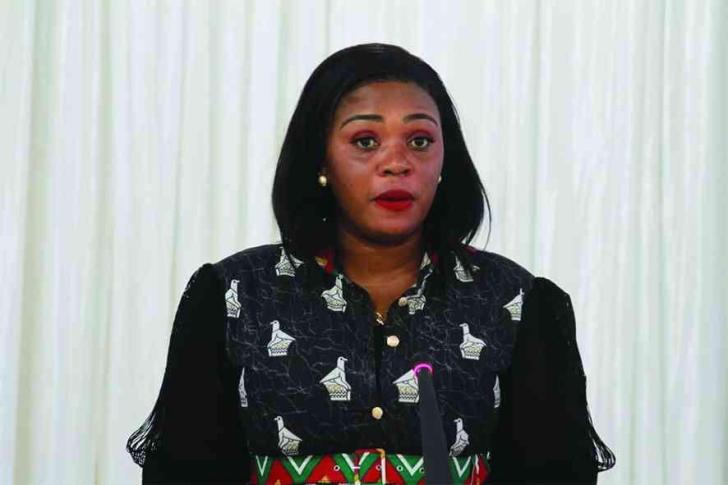News / National
Africa needs to improve internet connectivity
21 Nov 2024 at 06:29hrs |
0 Views

Zimbabwe's internet connectivity rate has reached an impressive 78%, far surpassing the African continent's average, which stands below 50%, according to Minister of Information and Communication Technology (ICT) and Courier Services, Tatenda Mavetera. However, she stressed that there remains a significant gap to be bridged in ensuring 100% internet penetration across Africa.
Mavetera made these remarks during her address at the 6th Privacy Symposium Africa held in Harare yesterday, which brought together experts, policymakers, and business leaders to discuss critical issues surrounding data protection, privacy, and technology's role in Africa's development.
While acknowledging the progress made in Zimbabwe, Mavetera emphasized the need for African nations to improve their internet infrastructure, urging them to work collectively to achieve universal internet access. "There is still much work to be done for African states to ensure that the continent achieves 100% internet penetration," she said.
The symposium also highlighted the intersectionality of gender, equity, and technology. Mavetera called for innovative solutions that prioritize inclusivity and ensure that technological advancements benefit all sectors of society, particularly women and marginalized groups.
In addition to addressing connectivity challenges, the minister advocated for a collaborative approach to implementing Artificial Intelligence (AI) across various sectors. She called on advisory bodies from Parliaments, public sector representatives, academia, and civil society to engage in meaningful discussions about AI's impact.
As part of Zimbabwe's efforts to drive inclusive technology policy-making, Mavetera announced the creation of a multi-stakeholder AI committee within the ministry. This initiative aims to ensure that all relevant stakeholders have a voice in shaping technology policies that impact the nation's future.
Meanwhile, Edward Mapara, Executive Secretary of the Law Society of Zimbabwe, raised concerns about the misuse of surveillance technologies, warning that such tools have historically been used to suppress freedom of expression in the country. He stressed the importance of creating regulations that safeguard citizens' constitutional rights while allowing technology to enhance democratic participation.
"Surveillance has been used as a tool of control, suppressing freedom of expression and democratic participation," Mapara said. He called for reforms that would balance the potential of technology with the protection of human rights.
Mapara also underscored the significance of safeguarding election data, a crucial element in maintaining trust in Africa's digital democracy. "Election data represents the will of the people. When compromised, trust in democratic systems is eroded," he said, adding that secure and transparent systems are essential for preserving the integrity of electoral processes.
The symposium also explored the complexities of election data management, with panellists emphasizing the need for secure and transparent systems to ensure the legitimacy of electoral processes across Africa.
The discussions at the event reinforced the growing importance of privacy, data protection, and digital security as Africa navigates the challenges and opportunities of an increasingly connected world.
Mavetera made these remarks during her address at the 6th Privacy Symposium Africa held in Harare yesterday, which brought together experts, policymakers, and business leaders to discuss critical issues surrounding data protection, privacy, and technology's role in Africa's development.
While acknowledging the progress made in Zimbabwe, Mavetera emphasized the need for African nations to improve their internet infrastructure, urging them to work collectively to achieve universal internet access. "There is still much work to be done for African states to ensure that the continent achieves 100% internet penetration," she said.
The symposium also highlighted the intersectionality of gender, equity, and technology. Mavetera called for innovative solutions that prioritize inclusivity and ensure that technological advancements benefit all sectors of society, particularly women and marginalized groups.
In addition to addressing connectivity challenges, the minister advocated for a collaborative approach to implementing Artificial Intelligence (AI) across various sectors. She called on advisory bodies from Parliaments, public sector representatives, academia, and civil society to engage in meaningful discussions about AI's impact.
As part of Zimbabwe's efforts to drive inclusive technology policy-making, Mavetera announced the creation of a multi-stakeholder AI committee within the ministry. This initiative aims to ensure that all relevant stakeholders have a voice in shaping technology policies that impact the nation's future.
Meanwhile, Edward Mapara, Executive Secretary of the Law Society of Zimbabwe, raised concerns about the misuse of surveillance technologies, warning that such tools have historically been used to suppress freedom of expression in the country. He stressed the importance of creating regulations that safeguard citizens' constitutional rights while allowing technology to enhance democratic participation.
"Surveillance has been used as a tool of control, suppressing freedom of expression and democratic participation," Mapara said. He called for reforms that would balance the potential of technology with the protection of human rights.
Mapara also underscored the significance of safeguarding election data, a crucial element in maintaining trust in Africa's digital democracy. "Election data represents the will of the people. When compromised, trust in democratic systems is eroded," he said, adding that secure and transparent systems are essential for preserving the integrity of electoral processes.
The symposium also explored the complexities of election data management, with panellists emphasizing the need for secure and transparent systems to ensure the legitimacy of electoral processes across Africa.
The discussions at the event reinforced the growing importance of privacy, data protection, and digital security as Africa navigates the challenges and opportunities of an increasingly connected world.
Source - newsday
Join the discussion
Loading comments…












































